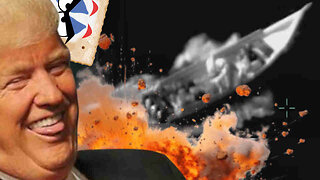Premium Only Content

Australian Authoritarian Surveillance, War Drums Are Beating in Armenia, Canadian Fake Jobs Numbers
The Armenia-Azerbaijan conflict is a longstanding geopolitical dispute that has its roots deeply embedded in history. This conflict centers around the contested region of Nagorno-Karabakh, a mountainous enclave located within Azerbaijan's borders but predominantly inhabited by ethnic Armenians. The dispute has witnessed cycles of violence and diplomatic efforts over the years, culminating in significant escalations and periods of relative calm. To comprehend the complexities of this conflict, it is essential to delve into its historical context, the roles of ethnic and religious identities, geopolitical interests, and the modern-day dynamics that continue to fuel hostilities.
Historical Context
The roots of the Armenia-Azerbaijan conflict can be traced back to the early 20th century when both nations were part of the Transcaucasian Democratic Federative Republic, which disintegrated in 1918. In the aftermath, the region became a battleground for newly formed states, including Armenia and Azerbaijan, as well as neighboring powers. The 1920s saw Soviet intervention, resulting in the establishment of the Azerbaijan Soviet Socialist Republic (ASSR) and the Armenian Soviet Socialist Republic (SSR). Nagorno-Karabakh, a predominantly Armenian-populated region, was assigned to the ASSR, a decision that would become a focal point of contention in later years.
The Ethnic and Religious Dimensions
One of the core elements of the conflict revolves around ethnic and religious identities. Armenians are predominantly Christian, while Azerbaijanis are primarily Muslim. This religious divide, coupled with ethnic differences, has contributed to the deep-seated animosity between the two nations. The perception of historical grievances and the desire for self-determination further fuel the conflict. The Armenian population in Nagorno-Karabakh, seeking closer ties with Armenia, has long demanded independence or union with Armenia, a claim rejected by Azerbaijan.
The Soviet Legacy and Dissolution
The collapse of the Soviet Union in 1991 brought about new dynamics to the Armenia-Azerbaijan conflict. As both nations gained independence, Nagorno-Karabakh emerged as a flashpoint. In 1991, Nagorno-Karabakh declared independence, leading to a full-scale war between Armenia and Azerbaijan. The conflict, marked by ethnic cleansing and displacement of populations, resulted in thousands of casualties and created a deep-seated animosity between the two nations.
Ceasefires and Unresolved Tensions
The 1994 Bishkek Protocol established a ceasefire, yet it failed to provide a lasting solution. Nagorno-Karabakh remained de facto independent but internationally unrecognized. The region was under Armenian control, further deepening Azerbaijan's resentment. The unresolved status of Nagorno-Karabakh has been a persistent source of tension, periodically erupting into violent clashes, such as the 2016 April War, which claimed hundreds of lives.
Geopolitical Interests
The Armenia-Azerbaijan conflict is not confined to historical or ethnic dimensions; it is also influenced by geopolitical interests. The South Caucasus region, which includes Armenia, Azerbaijan, and Georgia, holds strategic significance due to its proximity to critical energy corridors, such as the Baku-Tbilisi-Ceyhan pipeline. Moreover, Russia and Turkey have historically played pivotal roles in the region, each supporting different sides in the conflict. Russia maintains close ties with Armenia through mutual defense agreements, while Turkey supports Azerbaijan both politically and militarily.
The Escalation of 2020
In September 2020, the conflict witnessed a major escalation, marking the most significant outbreak of violence since the 1994 ceasefire. This escalation resulted in hundreds of casualties and led to the displacement of thousands. The conflict brought about international concern, with calls for a ceasefire and diplomatic intervention. The situation highlighted the urgency of finding a durable solution to the longstanding conflict.
Diplomatic Efforts and the Role of Mediators
Numerous international actors, including the Minsk Group co-chaired by Russia, France, and the United States, have sought to mediate the conflict. However, achieving a sustainable resolution has proven elusive. Efforts to negotiate a comprehensive settlement have been hindered by the deeply entrenched positions of both Armenia and Azerbaijan, as well as the complexities of addressing the status of Nagorno-Karabakh.
Conclusion
The Armenia-Azerbaijan conflict is a multifaceted issue that combines historical, ethnic, religious, and geopolitical dimensions. The unresolved status of Nagorno-Karabakh, coupled with the deep-seated animosities between Armenia and Azerbaijan, continues to be a source of instability in the South Caucasus region.
Australian Authoritarian Surveillance, War Drums Are Beating in Armenia, Canadian Fake Jobs Numbers
#mikeinthenight #mikemartins
-
 0:32
0:32
Mike Martins Channel
1 month ago $0.08 earnedbeauty of Manila
2452 -
 2:21:10
2:21:10
Badlands Media
10 hours agoDevolution Power Hour Ep. 386: Epstein Disclosures, Clinton Foundation, and Trump’s Wartime Authority
196K18 -
 2:07:22
2:07:22
Inverted World Live
10 hours agoGiant Asteroid Skims Past Earth Today | Ep. 102
47.1K5 -
 3:11:00
3:11:00
TimcastIRL
8 hours agoTrump Kills 11 Narco Terrorists, Democrats Warn War With Venezuela Coming | Timcast IRL
179K201 -
 13:07
13:07
Robbi On The Record
3 days ago $6.27 earnedSweet Poison: The Big Fat Lie That’s Killing America
52.1K26 -
 5:35:49
5:35:49
Drew Hernandez
13 hours agoEPSTEIN VICTIMS SPEAK OUT & TRUMP DOUBLES DOWN
46.9K37 -
 1:36:41
1:36:41
FreshandFit
8 hours agoWe Are QUITTING YouTube...
63.6K52 -
 2:34:22
2:34:22
TheSaltyCracker
8 hours agoDrug Smugglers Blown Up 9-03-25
107K224 -
 3:12:59
3:12:59
VapinGamers
8 hours ago $1.81 earnedGrim Trials - Game Review/Playthru - Rougelight Dungeon Crawler - !rumbot !music
34.4K -
 2:47:55
2:47:55
Mally_Mouse
15 hours ago🎮 Let's Play!! -- Jak 2 pt. 16
64.7K2